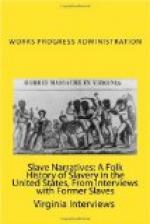WILLIAM NEIGHTEN:
William Neighten gave his address as 60th Street, Liberty City. He was only a baby when freedom came, but he too, “stayed on” a long time afterward.
He did not know his real name, but he was given his Massy’s name.
“Don’t ask me how much work I had to do. Gracious! I used to plow and hoed a lot and everything else and then did’nt do enough. I got too many whippings besides.”
RIVIANA BOYNTON:
Rivana Williams Boynton [TR: as in earlier interview, but Riviana, above] was born on John and Mollie Hoover’s plantation near Ulmers, S.C., being 15 years of age when the ’Mancipation came.
“Our Boss man, he had “planty” of slaves. We lived in a log houses. My father was an Indian and he ran away to war, but I don’t ’member anything of my mother. She was sold and taken away ’fore I ever knew anything of her.
“I ’member that I had to thin cotton in the fields and mind the flies in the house. I had a leafy branch that was cut from a tree. I’d stand and wave that branch over the table to keep the flies out of the food.
“I’d work like that in the day time and at night I’d sleep in my uncle’s shed. We had long bunks along the side of the walls. We had no beds, just gunny sacks nailed to the bunks, no slats, no springs, no nothing else. You know how these here sortin’ trays are made,—these here trays that they use to sort oranges and ’matoes. Well, we had to sleep on gunn sack beds.
“They had weavin’ looms where they made rugs and things. I used to holp ’em tear rags and sew ’em an’ make big balls and then they’d weave those rugs,—rag rugs, you know. That’s what we had to cover ourselves with. We didn’t had no quilts nor sheets not nothin like that.”
[TR: The following portion of this interview is a near repeat of a portion of an earlier interview with this informant; however it is included here because the transcription varies.]
“I ’member well when the war was on. I used to turn the corn sheller and sack the shelled corn for the Confederate soldiers. They used to sell some of the corn, and I guess they gave some of it to the soldiers. Anyway the Yankees got some that they didn’t intend them to get.
“It was this way:
“The Wheeler Boys were Confederates. They came down the road as happy as could be, a-singin’:
’Hurrah! Hur rah! Hurrah!
Hurrah! for the Broke Brook boys.
Hurrah! Hurrah! Hurrah!
Hurrah for the Broke Brook boys of South
Car-o-li-ne-ah.’
“So of course, we thought they were our soldiers singin’ our songs. Well, they came and tol’ our boss that the Yankees were coming and we had better hide our food and valuable things for they’d take everything they wanted.
“So they helped our Massy hide the things. They dug holes and buried the potatoes and covered them over with cotton seed. Then our Massy gave them food for their kindness and set out with two of the girls to take them to a place of safety, and before he could come back for the Missus The Yankees were upon us.




